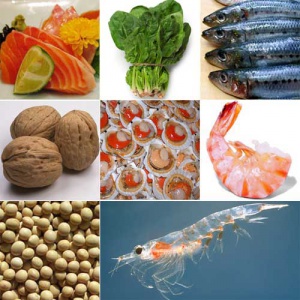Omega 3
Contents
Description
Omega 3 is an essential fatty acid (EFA). Humans and animals must ingest essential fatty acids for good health because the body requires them, yet does not have the ability to make them in the system. The three most nutritionally important Omega 3 fatty acids are alpha-linolenic acid, eicosapentaenoic acid (EPA) and docosahexaenoic acid (DHA).
Functions & Actions
Every cell in our body is surrounded by cell membranes composed of fatty acids. The membrane allows both nutrients to enter the cell, and toxins or waste to be removed. Without healthy cell membranes, cells lose their ability to hold water and vital nutrients. Omega 3 fatty acids also help offset other fats/oils in the body, such as Omega 6s.
Here are just some of the actions of Omega 3 fatty acids.
- helps reduce inflammation throughout the body
- acts as a blood thinner (prevents harmful clots)
- nourishes cell membranes
- lowers cholesterol and triglycerides
- artery health (prevents atherosclerosis)
- helps prevent cancerous cell growth
Health Benefits
Omega 3 essential fatty acids are extremely popular for all those interested in health and longevity. News reports, magazine articles, television and radio shows constantly discuss the effectiveness of Omega 3s as a nutritional necessity for both body and mind. Some of the conditions and diseases that Omega 3 consumption helps to prevent and treat are:
- cardiovascular disease
- type 2 diabetes
- Alzheimer's (memory and concentration)
- dementia
- depression
- rheumatoid arthritis
- osteo-arthritis
- fatigue
- hypertension
- skin ailments (dry and itchy)
- nail problems
- obesity
- macular degeneration (eye condition)
- alcoholism
Sources
Following are some of the Omega 3 rich foods:
- coldwater fish
- salmon
- krill (shrimp-like marine animal)
- sardines
- halibut
- herring
- chia seeds
- flaxseeds
- walnuts
- soybeans
- scallops
- shrimp
- some fruits and vegetables
Interactions & Side-Effects
Although side-effects are rarely seen, Omega 3 is a blood thinner and should not be taken by those with bleeding issues, or who are taking anti-coagulant (blood-thinning) prescription medications.
Related Discussions
- Omega-3s anti-inflammatory mechanism revealed
- Omega-3 Fatty Acids Linked to Younger Biological Age in CAD Patients
- Fish Oil - Omega 3
- Omega 3 Fats May Drop Endometriosis Risk
- Uncertainty about the benefits DHA
- Fish Oil Tablets
- Krill Oil and Diabetes
- Omega-3s Boost Infant Development
